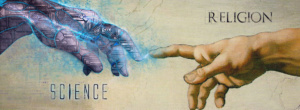By TAYLOR MORRIS, Student Reporter

In honor of Charles Darwin’s birthday and evolution weekend a science and religion workshop was held last Sunday in the Science Amphitheatre on campus.
Northwestern’s science department is involved in the Clergy Letter Project, which according to there website is an endeavor designed to demonstrate that religion and science can be compatible and their goal is to elevate the quality of the debate on the issue. Professor of Biology, Dr. Aaron Place, Assistant
Professor of Physics, Dr. Jennifer Sattler, and ordained pastor of the United Church, J.F. Wickey all spoke at the workshop on Sunday. Place focused on the coexistence of science and religion. According to Place, there has been a long history of conflict between science and religion and from the 16th century to the present the conflict has unnecessarily progressed. Additionally, he discussed the possible relationships between the two. Both science and religion stand-alone but have the ability to be reconcilable, Place said. Place also touched on the fact that there are benefits to starting a dialogue about science and religion. For example, studying and learning about creation brings people closer to God. “My hope is that people see that you actually can accept science and understand science and still be a religious person.” Place said. Sattler spoke about the big bang theory. “Scientist did not want the big bang theory to be true.” Sattler said. However, there is scientific evidence that it actually did happen. Sattler says, that residual heat left over from the big bang is what cemented the theory for scientists. According to Sattler, we won’t always know why particular things happen or why things are the way they are. “If research and science was easy we would have all the answers 4,000 years ago.” Sattler said. Wickey discussed religion and evolution. “Scientists help me understand God’s world better.” Wickey said. He discussed the possibility that maybe God created the world differently then people think and the fact that people who choose to reject reality are in fact psychotic. “I take the Bible very seriously, but I do not take it literally.” Wickey said. After the workshop the room full of students and faculty were able to ask questions and to provide input on how they felt about science and religion and how they coexist in the world. According to Place, the overall purpose of having this workshop is to show people that there can be a discussion about science and religion without name calling and just generally being civil with one another. Place said, “ The best way to get along with other people is to understand other people.”
